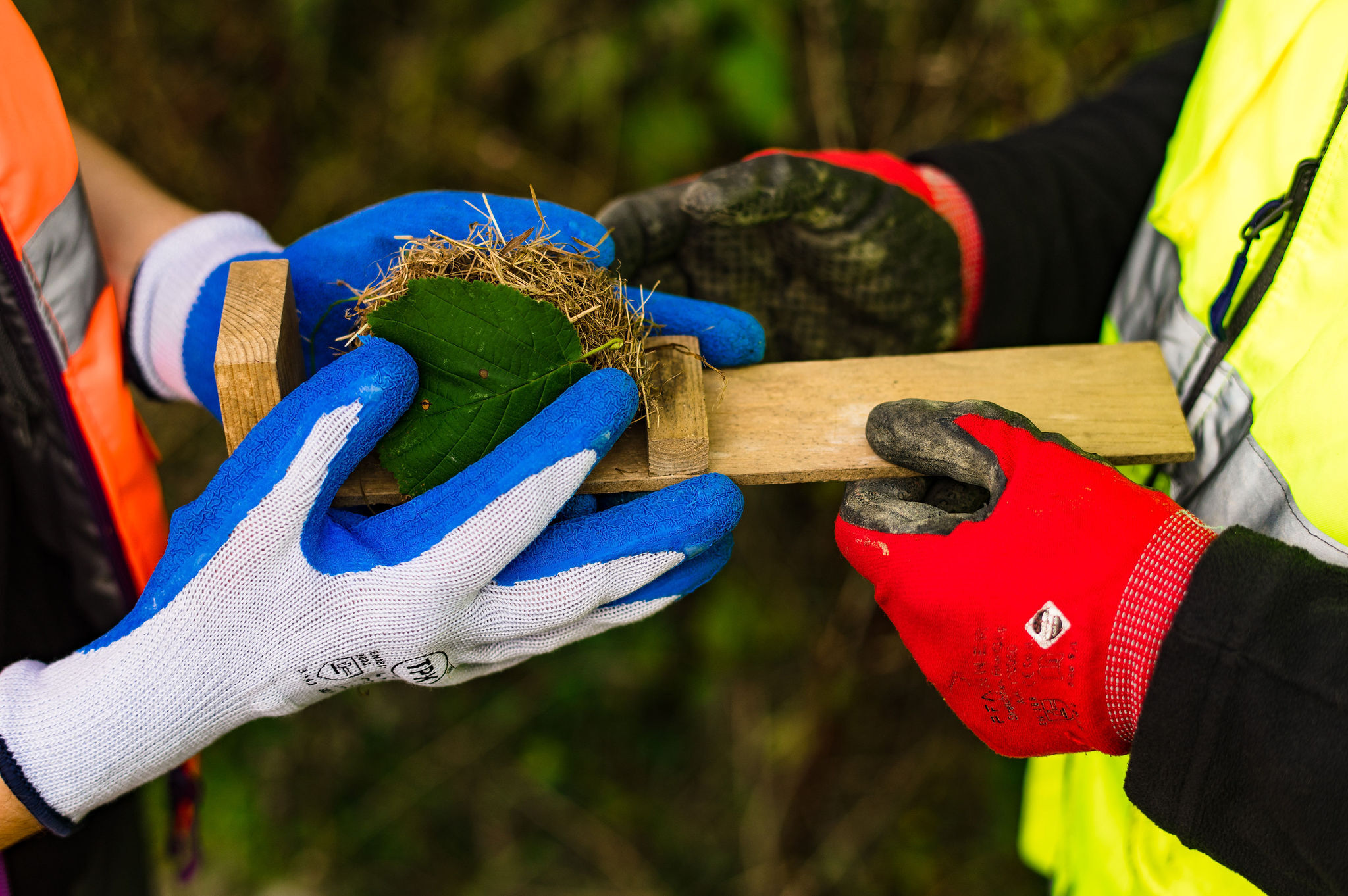
20.9K
Downloads
53
Episodes
A monthly show where we get to talk and learn about all things ecological, including interviews with top ecologists (both employers and employees), those working with ecologists, and also aspiring and inspiring career-seeking individuals setting out to make a difference. New episodes released first Monday of the month.
Episodes
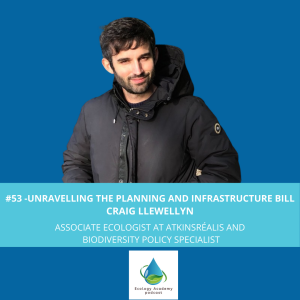
Monday May 05, 2025
#53 - Unravelling the Planning and Infrastructure Bill: Craig Llewellyn
Monday May 05, 2025
Monday May 05, 2025
Welcome back to the Ecology Academy Podcast, where host Richard Dodd offers an insightful deep dive into the current hot topic - the Planning and Infrastructure Bill. In this compelling episode, joined by Craig Llewellyn from AtkinsRealis, the discussion shifts from biodiversity net gain to the intricacies of the new bill, highlighting its implications for nature conservation and ecological planning.
Craig provides a comprehensive breakdown of the bill's objectives, such as expedited housing development and strategic planning, alongside revealing its potential pitfalls, including inadequate protection for protected species. As the conversation unfolds, listeners gain invaluable perspectives on how the bill could reshape planning systems, the risks of undermining ecological assessments, and the pressing need for amendments that safeguard nature and promote informed development.
Dive into this engaging dialogue that not only raises awareness of legislative complexities but also emphasizes the collective efforts of ecologists and policy advisors in striving for sustainable solutions in the face of governmental reform. A must-listen for everyone passionate about the environment and those seeking to make a positive impact in the field of ecology.
Craig Llewellyn
Connect with Craig on LinkedIn: https://www.linkedin.com/in/craig-llewellyn-cecol-mcieem-csjk-64854471/
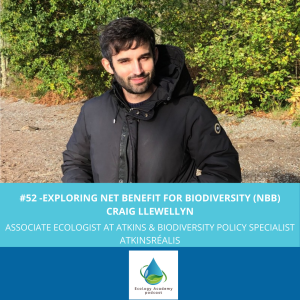
Tuesday Apr 29, 2025
#52 - Exploring Net Benefit for Biodiversity with Craig Llewellyn
Tuesday Apr 29, 2025
Tuesday Apr 29, 2025
Welcome to another insightful episode of the Ecology Academy podcast, hosted by Richard Dodd. Join us as we delve into the world of ecology with special guest Craig Llewellyn, Associate Ecologist and Biodiversity Policy Specialist at Atkins Realis. In this first part of a two-part series, we focus on the concept of 'Net Benefit for Biodiversity' within Wales' Planning Policy. Discover how this policy aims to enhance biodiversity at a broader ecosystem level using the innovative DECCA framework.
Craig Llewellyn shares his extensive experience and insights on the ecological assessment process, comparing the Welsh net benefit approach to England's biodiversity net gain. Learn about the components of the DECA framework—Diversity, Extent, Condition, Connectivity, and Adaptation to Change—and how they play a crucial role in sustainable development. Tune in to understand how ecological policies are evolving to meet current and future challenges in biodiversity conservation.
Background to NBB
The 2016 Environment (Wales) Act introduced a new legal duty on all public authorities to maintain and enhance biodiversity in carrying out their functions (the "Section 6 Duty”). The duty requires public authorities to promote the resilience of ecosystems. The newly implemented 12th Edition of Planning Policy Wales (PPW 12th Edition) requires planning authorities (LPAs) must demonstrate they have taken all reasonable steps to fulfil the Section 6 duty.
In Wales, the biodiversity net gain regime is termed “Net Benefit for Biodiversity” (NBB). While it has a similar intent to Biodiversity Net Gain (BNG) in England in delivering an overall improvement in biodiversity, NBB does not use a metric-based approach like BNG, which sets a baseline number of biodiversity units and requires developers to improve biodiversity by a minimum of 10%.
NBB supports a proactive approach to be taken by developers to biodiversity, wider ecosystem benefits, and resilience at the design stage. NBB applies to all development in Wales, even in cases where biodiversity value is being maintained rather than enhanced.
Unlike the quantitative approach of BNG for development in England, NBB takes a more site-specific and qualitative assessment based on the DECCA resilience attributes and the step-wise mitigation hierarchy.
- Diversity – Maintaining and enhancing diversity at all levels and scales
- Extent – Incorporating measures to maintain and increase semi-natural habitat area and linkages
- Condition – The condition affected by factors like climate change, invasive species, recreation, etc.
- Connectivity – Maintaining/creating links between and within habitats
- Aspects of resilience – The product of the above four attributes
Any proposed biodiversity enhancements must be appropriate to the local and national environment, considering strategic plans, local strategies, and evidence like area statements.
Ecologists need to take a “whole system approach” looking at the baseline biodiversity value and resilience of the entire site, its context in the wider landscape, and opportunities for enhancing resilience in line with the DECCA attributes.
A key principle of NBB is that biodiversity enhancement should be proportionate to the scale and nature of the proposed development.
While this means small developments can more easily deliver net benefit, it also means planning permission may be refused if no enhancement is proposed as part of an application (PPW 6.4.12).
Even where biodiversity value has been maintained on a site, the policy at 6.4.16 states “there must still be a proactive process to look for and secure enhancement through the design and implementation of the development.” Hence, going above and beyond simple mitigation is essential.
Developers in Wales will need to be aware of NBB and the Section 6 Duty. This brings additional complexity and cost to the development process.
Following the DECCA ecosystem resilience principles and step-wise avoidance/mitigation approach needs to be a central consideration from the very start of the development planning process. Innovative solutions, partnership working, and an appreciation of cumulative impacts in the wider area will all help deliver biodiversity benefits.
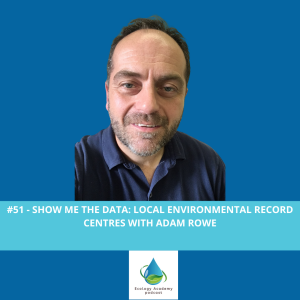
Monday Mar 03, 2025
#51 - Show Me the Data: Local Environmental Record Centres with Adam Rowe
Monday Mar 03, 2025
Monday Mar 03, 2025
Join host Richard Dodd in this enlightening episode of the Ecology Academy podcast as he converses with Adam Rowe, the CEO of the South East Wales Biodiversity Centre (SEWBReC). Discover the significant role Local Environmental Record Centres (LERCs) play in the gathering, management, and dissemination of biodiversity data.
Adam shares his journey from a geography graduate to leading a key hub in biodiversity data management, emphasizing the importance of data accuracy and sharing in conservation efforts. This episode offers valuable insights for ecologists, conservationists, and anyone passionate about biodiversity. Learn about the challenges and solutions in data management and how LERCs contribute to informed ecological decision-making.
Whether you're a seasoned professional or starting your career in ecology, this episode provides inspiring perspectives on making a meaningful impact in the field of conservation.
Adam Rowe (SEWBReC Chief Executive Officer)
Adam has managed SEWBReC for over 20 years and has over 30 years’ experience working in LERCs. Adam is co-founder and Vice Chairman of the Association of Local Environmental Records Centres (ALERC) and a former Trustee of the National Biodiversity Network Trust. He has lengthy experience of all aspects of the LERC operations, including strategic development, partner liaison, product/service design and project delivery.
Useful links (most mentioned during the podcast):
SEWBReC: https://www.sewbrec.org.uk/
LERC Wales: https://www.lercwales.org.uk/
ALERC LERC finder: https://www.alerc.org.uk/lerc-finder.html
Aderyn: https://aderyn.lercwales.org.uk/
Other useful SEWBReC links: https://linktr.ee/sewbrec
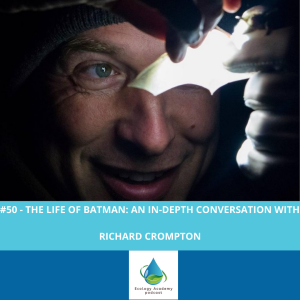
Monday Feb 03, 2025
#50 - The Life of Batman: An In-depth Conversation with Richard Crompton
Monday Feb 03, 2025
Monday Feb 03, 2025
Welcome to the Ecology Academy podcast, where host Richard Dodd interviews Richard Crompton from Ecology On Demand. Dive into a fascinating discussion as Richard shares insights from his 26-year career in bat and ecology work, focusing on his unique consulting service dedicated to supporting fellow ecologists. Discover the intricacies of ecological licenses, the significance of staying updated with technological advancements, and the importance of hands-on training through Richard's ventures like Team Bat.
Explore Richard's ambitious project aimed at transforming a country estate into a sanctuary for bats while fostering community and employment. Learn about the upcoming tech conference for ecologists, designed to equip participants with the knowledge and tools needed to excel in their field. Richard also touches upon the evolving ecology guidelines and their impact on the industry.
Engage with this conversation to gain insights into the challenges and triumphs within the ecological sector and find inspiration to contribute to a sustainable natural environment. Stay curious, be adventurous, and build bridges for a better tomorrow.
About Richard Crompton
Richard started studying bats whilst volunteering with the National Trust aged just 16. He was licensed in Wales by the age of 22 and undertaking commercial bat surveys. Skip forward 25 years and he has surveyed well over one thousand sites for bats, held dozens of European Protected Species licences since 2001 for more than a dozen different species of bats, delivered training throughout the England and Wales (to several thousand people). He spent nine years as a Trustee for the Bat Conservation Trust and has been an author/editorial board member for all four editions of the bat survey guidelines. Founder and co-director of award winning consultancy Wildwood Ecology Ltd until 2016 he now runs the Ecology on Demand bat advice service, the Bat Training partnership (who have trained over 300 people for their bat licences between 2008-2020) and the Team Bat online platform. He was elected to the Bat Conservation Trusts' Batty Hall of Fame in 2022 and is their 'agony uncle' for the Ecologists Anonymous - bat mitigation workshops. He is currently the resident bat advisor for the Crown Estate at Windsor Park, Cardigan Castle, The Museum of Welsh Life at St Fagans Cardiff, and Margam Park and Castle near Port Talbot - all great sites for bats!
Connect with Richard Crompton on LinkedIn
Find out more at Ecology on Demand or Team Bat
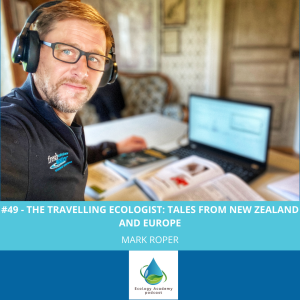
Monday Jan 06, 2025
Monday Jan 06, 2025
Happy New Year!
Join Richard Dodd in this episode of the Ecology Academy podcast as he sits down with Mark Roper, an experienced ecologist and consultant from New Zealand, who shares his fascinating journey in the world of ecology. With over 15 years in ecological consulting, Mark discusses his transition from freshwater fish surveys to a deep passion for bat conservation, both in New Zealand and Europe.
Mark delves into the challenges and opportunities he encountered while working with bats, including the rigorous certification process in New Zealand and the hands-on experience he gained in Finland and Sweden. He highlights the importance of social media in connecting with experts worldwide, allowing him to expand his knowledge and contribute to various conservation projects.
The conversation also explores the parallels and differences in ecological consultancy between New Zealand and Europe, emphasizing the significance of communication, project management, and understanding the interconnectedness of ecosystems. Mark's dedication to lifelong learning and collaboration shines through as he shares insights on how aspiring ecologists can leverage technology and global networks to enhance their careers.
Connect with Mark on LinkedIn: https://www.linkedin.com/in/markroyroper/
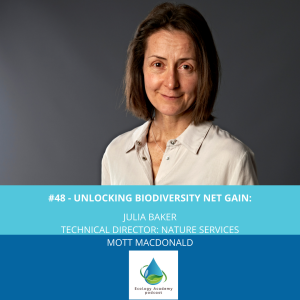
Monday Dec 02, 2024
Monday Dec 02, 2024
Join Richard Dodd and repeat guest Julia Baker on the final Ecology Academy podcast of 2024 as they delve into the significant legal changes surrounding biodiversity net gain in 2024. This episode explores the roles of ecologists, developers, and local authorities in implementing these new practices, focusing on both small and large-scale projects. Discover what practitioners have learned over the year, the challenges faced, and the collaborative efforts across various sectors to enhance our natural environments.
Julia shares her personal experiences and highlights the importance of early engagement in development projects. The episode also covers the need for effective communication and training to support all stakeholders involved, and how case studies are now starting to emerge as valuable resources for best practice.
Don't miss out on this informative discussion about biodiversity conservation, the regulatory landscape in different regions, and the outlook for the coming year. Whether you're an experienced ecologist or new to the field, this episode provides valuable insights and practical advice for navigating the evolving world of biodiversity net gain.
Wishing you Happy Holidays too and see you in the New Year!
---
Julia is the Technical Director of Nature Services at Mott MacDonald. Julia is the lead author of the UK’s Good Practice Principles on Biodiversity Net Gain, and has designed BNG for several infrastructure developments including transport, energy and housing. Julia was named on the ENDS Power List in 2022, 2023 and 2024, and is Chair of the ICE’s Nature and Biodiversity Taskforce.
Link to the Mandatory Biodiversity Net Gain - New Guidance for Practitioners from IEMA: https://www.iema.net/resources/blogs/2024/06/mandatory-biodiversity-net-gain-new-guidance-for-practitioners-from-iema-june-2024/
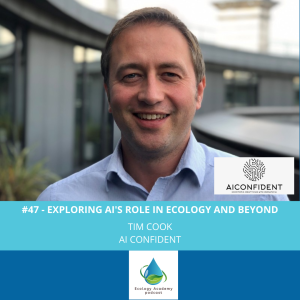
Monday Nov 04, 2024
Monday Nov 04, 2024
Join Richard Dodd in this episode of the Ecology Academy podcast as he delves into the intersection of ecology and artificial intelligence with Tim Cook, the founder of AI Confident. Tim shares insights about his company, a social enterprise dedicated to empowering organizations to make informed decisions about AI adoption, particularly those new to the technology.
The conversation explores how AI can be responsibly integrated into various sectors, including education and ecology, and addresses the ethical considerations and biases associated with AI technologies. Tim also discusses the importance of maintaining human elements in workflows and the potential of AI to enhance rather than replace human skills.
The episode provides valuable perspectives on the future of AI, its implications for jobs and skills in the ecology sector, and the importance of fostering informed discussions within organizations. Whether you're an ecologist, an AI enthusiast, or just curious about the future of technology, this episode offers thoughtful insights and practical advice.
Connect with Tim Cook on LinkedIn or visit AI Confident to learn more about how they help organisations with a purpose, to adopt and adapt to AI technology responsibly, thoughtfully & mindfully.
Also, here's the link to Better Images of AI as discussed in the pod: https://betterimagesofai.org/
Join us for a live event to equip managers, leaders, and business owners of environmental consultancies with essential and ethically-led AI skills and tools. Unlock the Power of AI for Your Environmental Consultancy
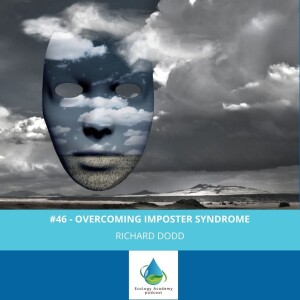
Monday Oct 07, 2024
#46 - Overcoming Imposter Syndrome
Monday Oct 07, 2024
Monday Oct 07, 2024
Join host Richard Dodd in this insightful episode of the Ecology Academy podcast as he delves into the topic of imposter syndrome and its impact on ecologists. After a summer hiatus, Richard returns to explore the challenges faced by professionals in the ecological field, particularly those striving for career advancement and leadership roles.
Richard shares his personal journey with imposter syndrome, discussing the common feelings of self-doubt and the fear of being exposed as a fraud. He provides valuable insights into recognizing and acknowledging these feelings, along with practical strategies to challenge negative thoughts and celebrate achievements.
Listeners will gain an understanding of how imposter syndrome can manifest in their lives and learn techniques to manage it effectively. Richard emphasizes the importance of seeking support, embracing growth opportunities, and practicing self-compassion to overcome imposter syndrome and thrive as an ecologist.
Tune in to discover how to navigate the imposter cycle and turn challenges into opportunities for personal and professional development.
Hidden Potential Coaching
If Imposter Syndrome is holding you back, then schedule a call with Richard Dodd, accredited Coach and Mentor. Understand what motivates you, your team or your business. Uncover resistances to change. Take action that aligns with what is truly important to you and others.
Schedule a free and confidential consultation call and discussion with Richard by visiting his website: https://hiddenpotentialcoaching.net/
Ecology Academy Courses
The Ecology Academy has a range of courses that can help you acquire and build the skills you need to succeed as an effective ecologist. Find out what's on offer here: https://training.ecologyacademy.co.uk/

Thursday May 23, 2024
#45 - Understanding the Role of an Ecological Clerk of Works
Thursday May 23, 2024
Thursday May 23, 2024
Welcome to the Ecology Academy podcast, hosted by Richard Dodd. In this episode, we delve into the role and responsibilities of an Ecological Clerk of Works. With summer in full swing, ecologists are busy with surveys and monitoring projects across the UK and beyond. Whether you’re in the UK or elsewhere, this episode is packed with valuable insights for aspiring and seasoned ecologists alike.
We explore the essential duties of an Ecological Clerk of Works, including site monitoring, implementing mitigation measures, ensuring compliance with environmental legislation, and effective communication with stakeholders. Richard discusses the importance of technical skills, regulatory knowledge, and best practices in habitat management.
In addition to technical expertise, the episode emphasizes the need for strong communication skills, stakeholder engagement, and problem-solving abilities. Richard also highlights the importance of maintaining professionalism, integrity, and continuous professional development.
Join us for a comprehensive overview of what it takes to excel as an Ecological Clerk of Works, and stay tuned for future episodes featuring interviews with experienced professionals sharing their tips and stories from the field. Thank you for listening to the Ecology Academy podcast!
Ecology Academy Training
https://training.ecologyacademy.co.uk/
Coaching, Mentoring and Consulting Services
If you would benefit from our coaching services, then schedule a FREE exploration call with Richard Dodd today.
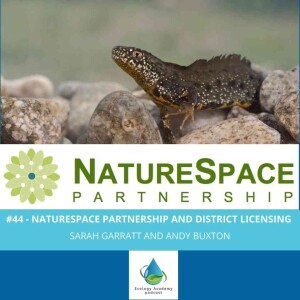
Monday Apr 01, 2024
Monday Apr 01, 2024
In this insightful episode of the Ecology Academy podcast, we explore the fascinating world of district licensing in ecological conservation with Sarah Garratt and Andy Buxton from NatureSpace. We delve into Sarah's contribution to NatureSpace's strategic licensing approach and Andy's role in the conceptualization of district licensing. Additionally, we discuss the importance of data in ecological research and predictive modelling's role in conserving Great Crested Newts.
We uncover the rigorous data collection process at NatureSpace and its amalgamation with species distribution modelling for newt conservation. Learn about our noteworthy strides in district licensing schemes and the remarkable improvements in landscape suitability for newt habitats.
The episode unearths NatureSpace's successful collaborations with reputable organizations such as the Amphibian and Reptile Conservation Trust and the University of Kent's Durrell Institute for Conservation and Ecology (DICE). We also delve into the benefits offered by district licensing to developers, both in terms of cost-saving and environmental impact.
We highlight the dedicated efforts of NatureSpace in creating and restoring habitats and the long-term management strategies with Natural England. Listen in as we explore the science-led approach of district licensing and how it promotes a collaborative outlook for multiple stakeholders.
The episode wraps up with the future of NatureSpace, integrating district licensing with biodiversity net gain (BNG) for better conservation outcomes, and how the district licensing scheme can benefit the advice given to developers by ecological consultants.
If you are a developer looking for practical solutions to ecological impacts and survey challenges, this enlightening conversation offers valuable insights and strategies. Join us as we unravel district licensing schemes with NatureSpace!
NatureSpace
Website: https://naturespaceuk.com/
The ‘old’ standard licensing route for great crested newts through Natural England often takes many months, without any specified deadline and requires a large amount of evidence to be submitted during the process. This option can often result in huge delays to development timelines and has gained great crested newts an unwelcome reputation.
Our District and Organisational Licence Schemes offer a simple and quick alternative, which is also available all year-round. Unlike Standard Licensing there is no need to wait for the seasonal survey window (March – June), there is no requirement for additional survey information to be provided and we can deliver a site assessment within just 10 working days.
Our Natural England approved impact assessments ensure developers pay fair and proportionate fees for their proposed development impacts, with money going straight into habitat creation, delivered by our NGO partners off-site. These compensatory habitats are created in strategic locations for newts, away from the pressures of development. Our partners create, manage and monitor these aquatic and terrestrial habitats for at least 20 years, ensuring a sustainable future for newts.
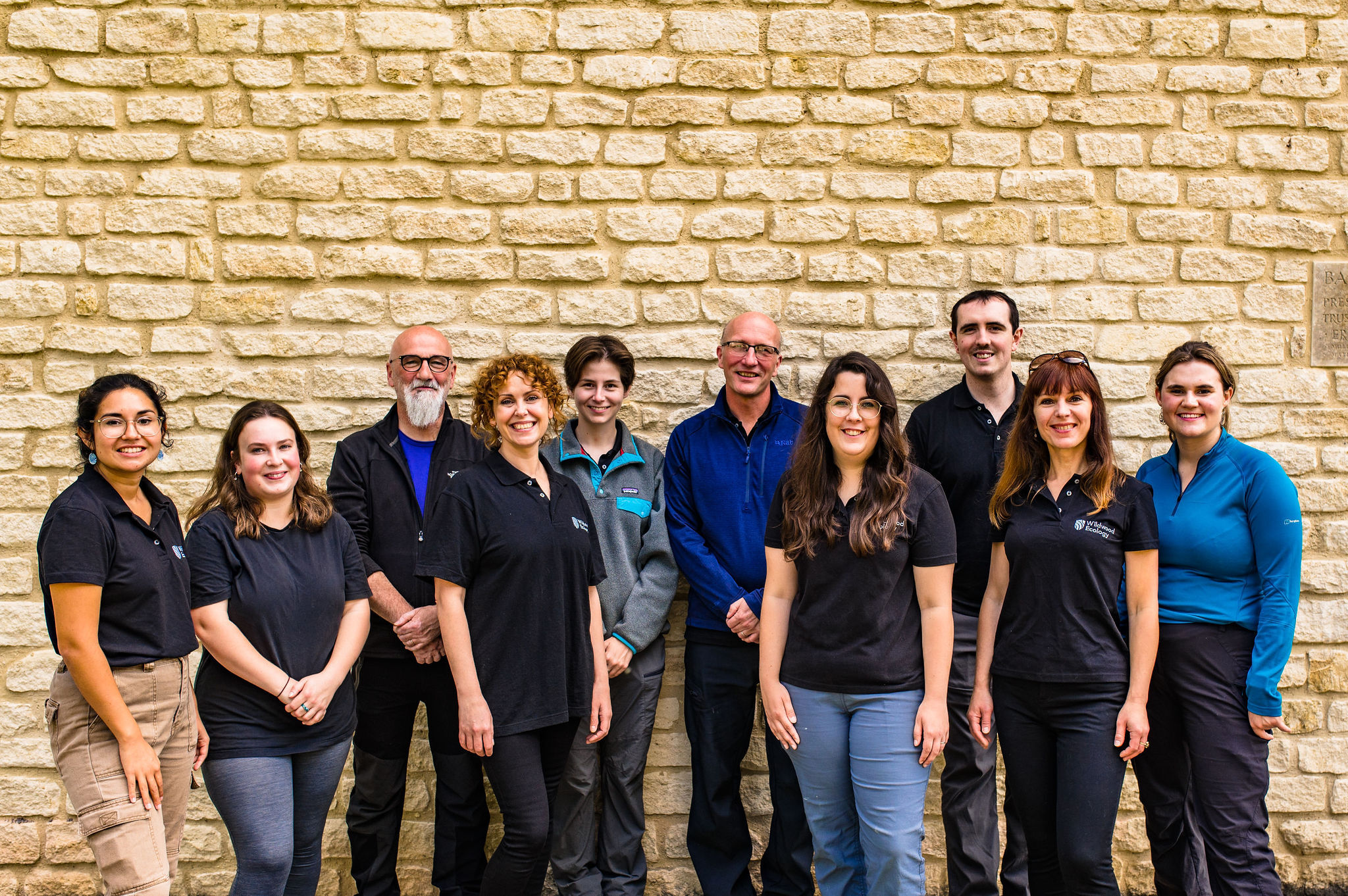
Ecology Academy Training
Online learning to help you get ahead in ecology.
It's a fact that many graduate ecologists struggle to secure that all-important first job. Competition, lack of real experience and absence of key skills can make it challenging to get the job you really want. Continuing to develop professionally may also take a back seat because 'real life' gets in the way. We teach the skills every professional ecologist needs in order to secure that job or bring greater value to the company you work for.
